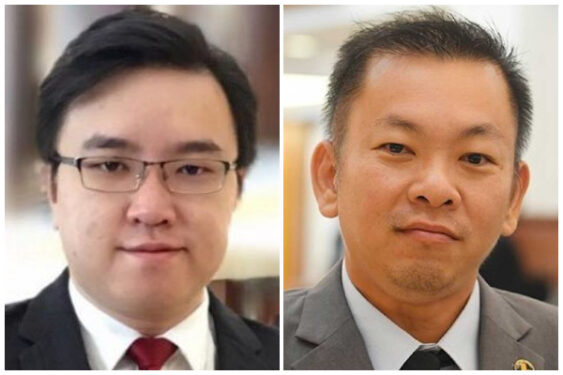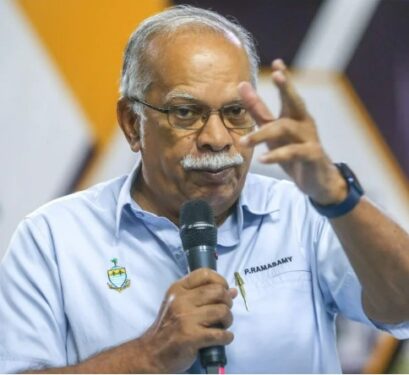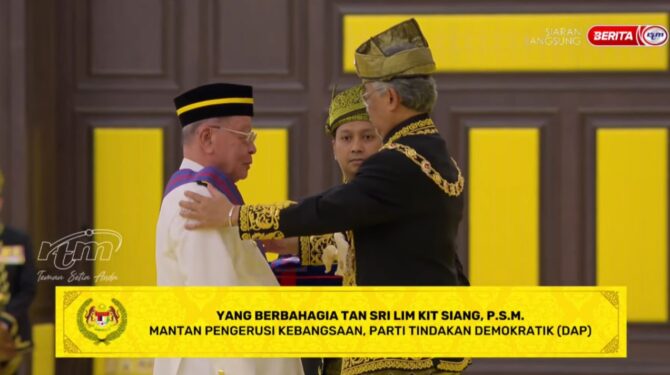THE controversy in the DAP over the matter of the honorific title of Datukship seems to have captured some imagination in the country.
It is not about right or wrong but whether the DAP can continue to exhibit high principles on mundane and everyday matters such as who gets awards and who doesn’t.
Recently, the DAP national leadership had threatened disciplinary action against two of its elected state assemblymen in Sabah (namely, Datuk Chan Foong Hin and Datuk Phoong Jin Zhe) for violating the party’s policy against accepting the state Datukship award.
The DAP policy stipulates that only retired assemblymen can apply and receive the honorific awards. As such, both state representatives defied the party’s policy by accepting the award. However, before the party could contemplate action, they have apologised.

The DAP leadership might threaten action but they know very well that nothing much can be done because of earlier precedents. Henceforth, the apology from the elected representatives provides a way out for the party to maintain its dignity.
It was not two representatives who pushed themselves in the corner but the DAP leadership. For a long time, it was the ideology of the party based on certain principles that determined the struggle of the DAP.
Out of these principles, policies might emerge now and then especially if the party is in government. The DAP’s policy towards honorific state and federal awards has undergone change.
When the party was in the opposition, it was a taboo for DAP members to get Federal or state honorific titles. The party differentiated itself from the BN political parties among others on the receipt of awards and titles.
Party stance compromised
However, things changed when the party tasted power and positions – first at the level of the state governments and later at the federal level.

The strict embargo on party members not to receive state and federal awards was relaxed somewhat after 2008 especially after the DAP became a partner in the state governments in Penang, Perak, Selangor and Negri Sembilan.
However, before the policy was somewhat relaxed, some elected representatives defied the party by receiving state awards, in particular the Datukship. No doubt some party leaders were furious but, in the end, no disciplinary action was taken against elected representatives who were the award recipients.
Since the awards were the courtesy of the state rulers and governors, the party did not want to disrespect them. Even the recipients of the award used the same argument of respect towards the rulers and governors in not rejecting their Datukship award.
If I am not mistaken, it was only after these incidents that the party made a policy decision to allow retired elected representatives to accept the award.
Meanwhile, states like Penang made provision for DAP members to apply for awards but not elected representatives with conditions attached. Even before the relaxation of the policy by the DAP, there was much frustration among retired and veteran DAP members from being prevented from getting the honorific titles.
This frustration was to some extent contributed by the fact that the awards were much readily available for members of the Barisan Nasional (BN) political parties than those from the DAP.
The argument was why should these BN party members who stood against the DAP be awarded the titles when DAP members who stood through thick and thin with the party were denied the opportunity.

Compromising principles
I still remember a case in Penang of a veteran member who contributed funds to the party during difficult times was rejected outright for Datukship because of the party’s policy. Later the party relented by awarding him a Datukship.
For many DAP members especially the veterans, the honorific title of Datukship might be useful for them in their business activities especially in dealing with government agencies and others.
As they supported the party during difficult times, wouldn’t it be logical that the party assist them in furthering their business and entrepreneurial activities in the later part of their lives?
Agree or not, DAP is not the same party it once was. Struggle for principles has taken a back seat for the party to play a more practical role in the governments both at the state and Federal levels.
There is nothing wrong for the party which has become part of the power that be to hold positions for the benefit of the people. However, it is one thing to be part of the government but another to sacrifice the principles that the party stood for.
No political party remains the same with the passage of time. Changes are bound to occur but certainly there is no need to alter core principles that have guided the party for long.
In this respect, it serves DAP no purpose to restrict the award of Datukship and other honorific titles to its member’s whether elected or non-elected. If the party’s core principles are being watered down, then what is the point of the obduracy on the award of titles?
This is a kind of misplaced priority. It is about time the party took the decision to clear all restrictions and conditions imposed on party members including elected representatives to accept honorific awards or titles. – Oct 28, 2023
Former deputy chief minister II of Penang and ex-Perai state assemblyman Prof Ramasamy Palanisamy was also a former Penang Development Corporation (PDC) board member.
The views expressed are solely of the author and do not necessarily reflect those of Focus Malaysia.
Main pic credit: Bernama









